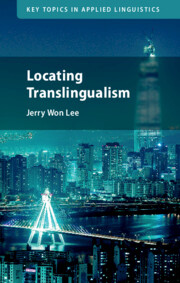Book contents
- Locating Translingualism
- Key Topics In Applied Linguistics
- Locating Translingualism
- Copyright page
- Dedication
- Contents
- Figures
- Acknowledgments
- Notes on the Text
- Introduction
- 1 Translingualism and the Locations of Culture
- 2 Locating Global Korea
- 3 Encountering the Unfamiliar: Languaging Culture
- 4 Visible Nation: Scaling Culture
- 5 Semiotic Excess: Tracing Culture
- Conclusion: More Locations of Culture
- References
- Index
2 - Locating Global Korea
Published online by Cambridge University Press: 31 March 2022
- Locating Translingualism
- Key Topics In Applied Linguistics
- Locating Translingualism
- Copyright page
- Dedication
- Contents
- Figures
- Acknowledgments
- Notes on the Text
- Introduction
- 1 Translingualism and the Locations of Culture
- 2 Locating Global Korea
- 3 Encountering the Unfamiliar: Languaging Culture
- 4 Visible Nation: Scaling Culture
- 5 Semiotic Excess: Tracing Culture
- Conclusion: More Locations of Culture
- References
- Index
Summary
This chapter explains the importance of a sustained study of the linguistic/semiotic landscape of global Korea not only in obvious ways for scholars of Korean studies but also to readers more generally interested in language and globalization even without a stated interest in Korea per se. Doing so comes with the related task of providing necessary background on Korea as a national imaginary with a particular focus on aspects of its ethnic national heritage that are relevant to its iterations across the linguistic/semiotic landscape of global Korea. In other words, this chapter describes what some of the generalizable characteristics of Korea are (for readers interested in the globalization of culture) while also describing what makes Korea “unique,” which is particularly important given the focus of the book, to explore the mechanics by which a given cultural entity can come to be semiotically salient (i.e., distinguishable) across global space. This chapter also serves as the space to provide some background to the study that informs this book, describing the various iterations it has taken since 2012.
Keywords
- Type
- Chapter
- Information
- Locating Translingualism , pp. 54 - 76Publisher: Cambridge University PressPrint publication year: 2022

